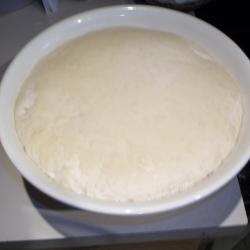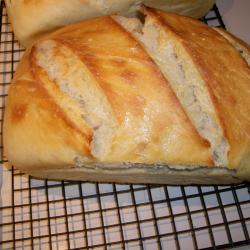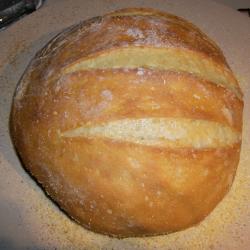Hi all! I am new to sourdough, but not to bread baking. My mother taught all us boys how to cook. It is interesting to read all the different sourdough starter recipes and proofing methods. I'd like to offer a few observations to anyone just starting out.
If you are a "student" and read a lot before you try something you will soon see that out of 100 people that make a sourdough starter there are almost that many methods of doing it. If you are a true student of history you will already know that yeast strains are very resiliant.
If you are overly worried about temperature, contamination, hydration, etc. think about the 49ers and the old cook at the chuckwagon on a cattle drive. Conditions were not very controlled or controlable during those times! Yet they built a legacy of sourdough that attracts us today!
I read through dozens of sourdough starter recipes and then went down the middle with my knowlegde of how yeast and dough works.
My starter is a very thick batter. It began with water and rye flour. At day five I began dropping off the rye and introducing unbleached all purpose flour. I keep my start on top of the refrigerator in a glass jar
I feed it daily (usually) and bake off two loaves every five days or so. I discovered a sourdough english muffin recipe that I use to bake off some excess starter if it isn't convient for me to do a regular baking.
I would say if you live in a municiple district where your water is chlorinated, use a bottled spring water, just to be safe.
I normally mix my dough (using 2 cups starter and about 5-6 cups flour) the night before and let is rise overnight. This seems to work well for me. By the way, it is winter here, freezing outside and we tend to keep the house at 68 duirng the day and 62 at night and when we are away (working).
Maybe I've just been lucky, but it seems to me that it is a fairly easy process and makes wonderful bread! I have two boys and between the four of us there isn't any bread left over!

This is the bowl of proofed (proven?) dough after an over night rise.

This is one of my finished loaves.

This round loaf was shaped without a bowl. I baked it on a pizza stone.



Replies
The bread really looks good. Years ago I started thinking like what you mentioned here in your post. What did all the 49ers and cuck wagon cooks do to make and keep a sourdough starter? That even helped me with some of the sourdough foods I make like pancakes. They could get all fancy with ingredients because it would have been to hard. They had to keep it simple.
I am a novice at this for only a couple of weeks. Made my first loaves last weekend and they were pretty good but my starter didn't seem to look good although it keeps bubbling after every feed so I keep it up. Your comments about a batter like starter consistency and the 49ers instilled some confidence. Thanks.
Your bread is beautiful! I havent started this yet due to a very busy year of homeschooling a teenager and running after a sweet busy girl named Abigail.Our son Loves bread but it does not return the affection. I am on a quest for a recipe that uses cooked rice instead of flour if anyone has one. Thank you!
Hi marym,
I haven't done this sort of thing but there seems to be plenty of references out there on the web.
Here is one picked at randomas an example (I have no connection with and am not recommending this site or its products).
http://www.culturesforhealth.com/gluten-free-brown-rice-sourdough-bread-...
Let us know how you go and good luck with your projects.
Farinam
Hy and welcome here !
Hi, i baked my first sourdough from the sourdough starter I purchased from you. It turned out really good, the best I have made. Just one question. When I feed my starter with white unbleached flour the starter is not very active, but when I feed it with rye flour it really gets going, Why is this so, and can I feed the starter with rye flour and use it to make a white loaf?
Clarissa
Hello clarissad4,
Rye flour apparently has some enzymes that are particularly favourable for encouraging yeast growth. I and many others regularly feed their starter with a blend of rye and white wheat flour ( 10-20% rye). If you do this and prepare your levain for a loaf by feeding with just white flour the amount of rye in the loaf is barely perceptable. If you want a particularly white loaf you can build the required amount in several stages from a small amount of your stock.
Have a read of SourDom's beginners blog on this site for a good general primer on starter preparation and maintenance and dough development and shaping.
Good luck with your projects.
Farinam